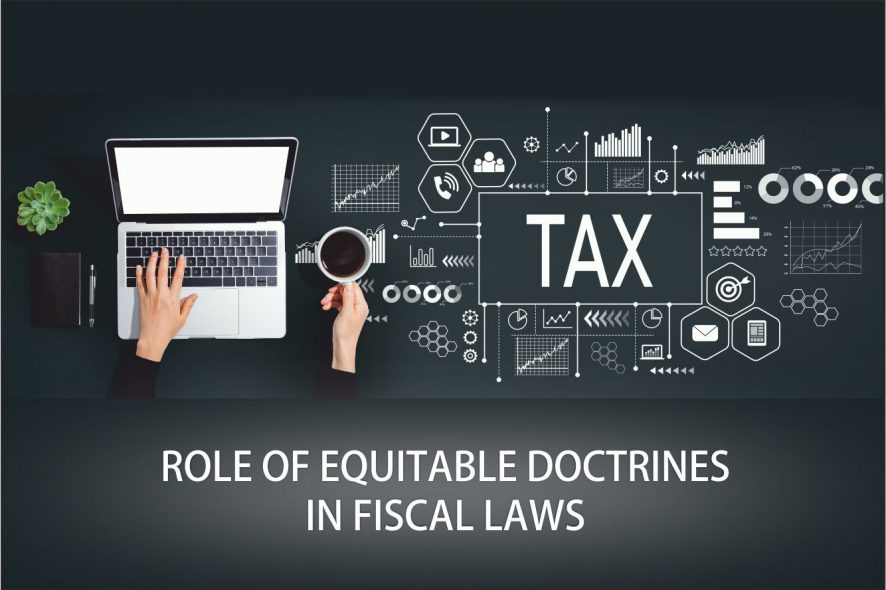Introduction
Traditionally fiscal laws have their own nuanced interpretation regime wherein strict interpretation of the statute and preference for literal meaning is the order of the day.[1] The observation of Rowlett, J.[2] is often cited to restate the legal proposition that there is no equity in a taxing statute and the intent of the legislature as emanating from the statutory text has to be given effect. Hardships in implementation and regard for consequences are often prepositions which do not find favour in context of fiscal laws.[3] Accordingly the general impression appears to be that equitable doctrines have absolutely no space in the fiscal realm. This impression, however, is not correct as there are many exceptions, principally owing to the judge-made law which has sought to introduce a variety of equitable doctrines in the taxation laws. This article enlists a few such judicially imbibed doctrines.

Doctrine of Promissory Estoppel
Is it possible for a taxpayer to content that the Government is estopped from giving effect to certain fiscal provisions, or, alternatively, the Government is obliged to extend certain fiscal benefits to the taxpayer? Multiple variations of these question have often come across the Indian courts, though with mixed results.[4]
The locus classicus on this aspect is the decision of the Supreme Court in Motilal Padampat[5] wherein the Supreme Court examined in detail the doctrine of promissory estoppel, throughout its evolution under the common law and its application under the Indian legal system. This judgment declared[6] that it is in principle possible for the taxpayer to claim that the Government has estopped itself through express conduct and therefore cannot operate to the detriment of such taxpayer. The decision in Motilal Padampat[7] and many other judgments which have followed it, such as Nestle[8], Manuelsons Hotels[9], etc., deal with situations where and assurance of tax exemption was given by the Government and later breached despite the taxpayers having acted on the basis of such assurances. In such cases, the Supreme Court has come to the rescue of the taxpayer by declaring that it is not open to the Government to resile from their solemn assurances.
The position, however, is not unequivocal as there are certain decisions which declare that notwithstanding the promises the Government can act to the contrary where overriding “public interest” so requires or where the Government exercises its legislative power. The decisions of the Supreme Court in Kasinka Trading[10], Kothari Industrial[11], and more recently in Unicorn Industries[12], etc. uphold the power of the Government to act despite its promises and assurances in certain situations.
In summary, the doctrine of promissory estoppel does find a place in the interpretation of fiscal statutes, though its application is not unwavering.
Legitimate Expectation Principle
Another facet of equitable doctrines being installed in the interpretation of fiscal statutes is the application of legitimate expectation principle. In multiple decisions, the Supreme Court has applied this principle to declare that the Government is obliged to enforce the assurances of tax exemptions which it makes to the taxpayers, by way of formal executive documents and delays or inaction of the Government can be judicially addressed by applying this principle. For illustration, the decisions of the Supreme Court in Suprabhat Steel[13], Kalyanpur Cement[14] and, more recently in, Brahmputra Metallics[15] declare that once the Government has issued an industrial policy in terms of which certain tax exemptions have been assured, inaction of the Government in enforcing such exemptions is not permitted in view of the legitimate expectation of the taxpayer arising in terms of such policy. Thus, equitable entitlement has been extended to the taxpayer by applying this principle of legitimate expectation as well.
Doctrine of Fairness
As stated earlier, hardship in giving effect to the stipulations of the fiscal law is often considered irrelevant. Conversely, it could be argued, as it is often, “fairness” is not a consideration in the interpretation of fiscal laws.[16] Such conclusion would be incorrect. A five-Judge Bench decision of the Supreme Court in Vatika Township[17] traversed through competing jurisprudential theories to declare the need to balance the rights of the subject taxpayers vis-à-vis the State. opining that there was a need to instil fairness in the interpretation of taxing statutes, this judgment declares that oppressive tax laws cannot be implied to carry retrospectively application and if indeed an oppressive tax law has to be given effect retrospectively, it shall be given effect only in presence of specific legislative mandates. In other words, the Supreme Court ruled out impliedly retrospective consequences for the taxpayers. This decision must be read in conjunction with the earlier decisions on the subject holding that those government instructions under the taxing laws which are favourable to the taxpayers must be given retrospective effect whereas instructions against the interests of the taxpayers must be applied only prospectively.[18] In other words, albeit in the limited context of retrospectivity, the doctrine of fairness does exist in the fiscal space.
Aspects of “Reasonableness” and “Fair Play” in Operation of Taxing Statute
Apparently owing their origins to the administrative law principles, a number of equitable doctrines appear to have been implanted in the practical enforcement of the taxation laws. For illustration, natural justice principles being read in the law even where the taxing statute does not provide so,[19] principles governing fair play in tax adjudication,[20] mandate for the Government to expressly set out the allegations against the taxpayer such that they can be defended adequately,[21] rule against predetermined tax enquiries,[22] right against coercive actions by the tax authorities and non-sustenance of extra legal measures,[23] etc. are some of the judicially affirmed equitable propositions which find their place in the tax law. In fact, there are certain instances of substantive application of such principles insofar as statutory instruments have also been quashed by the quotes on the ground that they violate the principle of reasonableness and fair play which emanates from the larger and expensive construction of Article 14 of the Constitution of India.[24]
Conclusion
From the above discussion it is apparent that the general rejection of equity in interpretation of taxing statutes, the invocation and application of equitable doctrines in the fiscal space by the judiciary is a clear testament that even tax laws have to operate within the same rule of law framework under which the other laws find their feet. It is no doubt true that such judicial interventions are infrequent, nonetheless, they repel the perception that equity is anathema to tax.
† Advocate, Supreme Court of India; LLM (Taxation), London School of Economics.
[1] A recent five-Judge Bench decision of the Supreme Court observes, “it is well settled that in a taxation statute, there is no room for any intendment; that regard must be had to the clear meaning of the words and that the matter should be governed wholly by the language of the notification. Equity has no place in interpretation of a tax statute. Strictly one has to look to the language used; there is no room for searching intendment nor drawing any presumption. Furthermore, nothing has to be read into nor should anything be implied other than essential inferences while considering a taxation statute”. Commr. of Customs v. Dilip Kumar and Co., (2018) 9 SCC 1 at para 29.
[2] Cape Brandy Syndicate v. Inland Revenue Commissioners, (1921) 1 KB 64.
[3] “In the case of taxation, it is settled law that hardship or equity has no role to play in determining eligibility (sic exigibility) to tax and it is for the legislature to determine the same.” Union of India v. M.V. Valliappan, (1999) 6 SCC 259 at para 19.
[4] See, Tarun Jain, “Promissory Estoppel: A Fading Enigma in Fiscal Space?”, NLUJ Law Review, (2020) 7(1) NLUJ Law Review 1-42 (available at HERE) for a critical review of the legal position on the application of this doctrine in the Indian fiscal jurisprudence.
[5] Motilal Padampat Sugar Mills Co. Ltd. v. State of U.P., (1979) 2 SCC 409.
[6] Extending the declaration in Union of India v. Indo-Afghan Agencies Ltd., AIR 1968 SC 718 : (1968) 2 SCR 366.
[8] State of Punjab v. Nestle India Ltd., (2004) 6 SCC 465.
[9] Manuelsons Hotels (P) Ltd. v. State of Kerala, (2016) 6 SCC 766.
[10] Kasinka Trading v. Union of India, (1995) 1 SCC 274.
[11] Kothari Industrial Corpn. Ltd. v. T.N. Electricity Board, (2016) 4 SCC 134.
[12] Union of India v. Unicorn Industries, (2019) 10 SCC 575.
[13] State of Bihar v. Suprabhat Steel Ltd., (1999) 1 SCC 31.
[14] State of Bihar v. Kalyanpur Cement Ltd., (2010) 3 SCC 274.
[15] State of Jharkhand v. Brahmputra Metallics Ltd., 2020 SCC Online SC 968.
[16] See contra, Hindustan Sugar Mills v. State of Rajasthan, (1978) 4 SCC 271 inter alia observing that “We think that, in the circumstances, fairness and justice demand that the Central Government should pay to the assessee the amount of sales tax on the freight component of the price in respect of transactions of sale of cement entered into by the assessee with them under the provisions of the control order. It is true and we are aware that there is no legal liability on the Central Government to do so, but it must be remembered that we are living in a democratic society governed by the rule of law and every Government which claims to be inspired by ethical and moral values must do what is fair and just to the citizen, regardless of legal technicalities. We hope and trust that the Central Government will not seek to defeat the legitimate claim of the assessee for reimbursement of sales tax on the amount of freight by adopting a legalistic attitude but will do what fairness and justice demand. After all, the motto of every civilised State must be: ‘Let right be done’.”
[17] CIT v. Vatika Township (P) Ltd., (2015) 1 SCC 1.
[18] For illustration, Suchitra Components Ltd. v. CCE, (2006) 12 SCC 452.
[19] Kesar Enterprises Ltd. v. State of U.P., (2011) 13 SCC 733.
[20] Nagarjuna Construction Co. Ltd. v. Govt. of A.P., (2008) 16 SCC 276.
[21] SACI Allied Products Ltd. v. CCE, (2005) 7 SCC 159.
[22] Oryx Fisheries (P) Ltd. v. Union of India, (2010) 13 SCC 427.
[23] Dabur India Ltd. v. State of U.P., (1990) 4 SCC 113.
[24] For illustration, see Union of India v. N.S. Rathnam and Sons, (2015) 10 SCC 681.







Great information on Role of Equitable Doctrines in Fiscal Laws